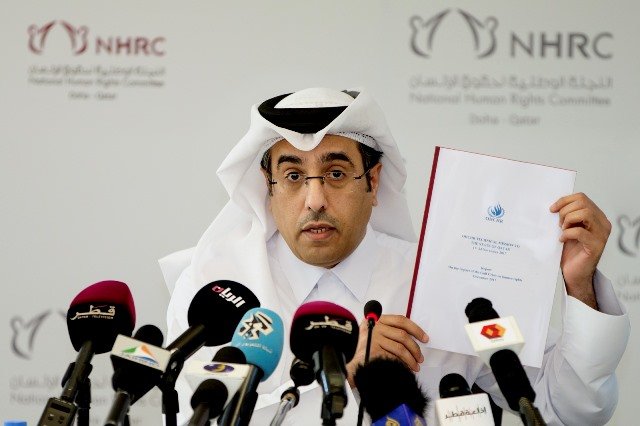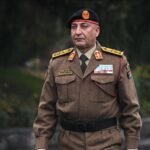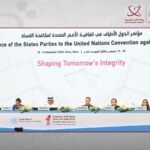Doha 08 Jan. 2018
Dr. Ali Samikh AlMarri, President of National Human Rights Committee of Qatar hasHe asked thanked UN Office of High Commissioner for Human Rights on the first ever report released on the drastic impact on common person from the siege of Qatar since last 7 months by the neighboring countries of Saudi Arabia, Bahrain and United Arab Emirates. from inter-marriages, businesses, education, free movement to religious practices.
He stressed on the blocked countries to look positively on the report and lift the blocked against State of Qatar to provide relief to Qatari nationals and the expatriates living in Qatar.
Dr. Al Marri asked Office of the UN High Commissioner on Human Rights to include this report into UN Secretary General Report and to follow these blocked states to lift the blocked by using his offices and other related organizations.
Dr. Ali AlMarri has asked government of Qatar to use this report on various platforms to convince specially 'Neutral' states. He said being neutral on human rights abuses is itself against human rights.
Dr. Ali AlMarri has asked Compensation Committee of Qatar to use this UN report to show to International Court of Justice to get compensation early against their claims of damages to the affected people.
Following are main highlights :
- Since the beginning of the blockade, Qatar National Human Rights Committee has addressed the United Nations High Commissioner for Human Rights through official correspondence. The president of Qatar National Human Rights Committee has met twice with Prince Zeid Ra'ad Zeid Al-Hussein, the UN High Commissioner, and held a series of meetings with the Middle East and North Africa Section of the High Commissioner for Human Rights.
- From the first weeks of the blockade, the High Commissioner issued an official statement on the repercussions of the blockade on the human rights of citizens and residents and on its impact on the freedom of opinion and expression. This statement was followed by a press release issued by the OHCHR and a statement condemning the demand to close Al-Jazeera and other Qatar-backed news outlets issued by the Special Rapporteur on Freedom of Opinion and Expression.
- On 14 September 2017, the president of the NHRC invited the High Commissioner to dispatch a technical mission to Qatar, as soon as possible, to assess the impact of the crisis on human rights. Subsequently, the Middle East and North Africa (MENA) Section informed the Permanent Missions of KSA, UAE and Bahrain about the invitation, expressing the readiness to conduct similar missions. The MENA Section further informed the United Nations Department of Political Affairs, the United Nations Task Force on the Gulf crisis and other relevant actors about OHCHR’s engagement with the States concerned.
- The OHCHR has been communicating with the countries of the blockade to inform them of the functions of the technical mission and request to deal with it and allow it to monitor closely the human rights related cases affected as a result of the blockade, but OHCHR received no response.
5. The OHCHR team visited the State of Qatar during the period from 17 to 24 November.
- The mission was facilitated by the NHRC, whose support was highly appreciated. The team met with representatives of 20 governmental and non-governmental organizations and 40 victims as follows:
- NHRC
- Ministry of Foreign Affairs
- Ministry of Defence;
- Ministry of Interior;
- Ministry of Economy and Trade;
- Ministry of Administrative Development;
- Ministry of Labour and Social Affairs;
- Ministry of Education;
- Ministry of Health;
- Ministry of Religious Affairs;
- Customs Authority;
- Chamber of Commerce;
- Qatar University;
- Qatar Foundation;
- Director of the Salwa crossing point with Saudi Arabia;
- Qatar News Agency,
- Editors in chiefs of all main local newspapers,
- Staff of Al Jazeera
- High Audio-visual Authority;
- Compensation claims commission (
- Migrant communities,
- Qatar Airways.
- Regional representatives of UNESCO and UNODC.
The team interviewed about 40 individuals to get a better understanding of their situation.
- The Mission issued a report on the repercussions of the blockade on the enjoyment of human rights and the humanitarian situation of citizens and residents of Qatar and the citizens of the GCC countries affected by the crisis.
- There are four categories of victims of the crisis:
- Qatari individuals who were residing in KSA, UAE, Bahrain (and studying in Egypt), and were compelled to rapidly exit these countries, leaving behind their family, businesses, employment, property, or being forced to interrupt their studies.
- KSA, UAE and Bahrain nationals who resided in Qatar (including many married to Qataris) and felt compelled to move to their country of origin, and have consequently been separated from their family, source(s) of income and/or property.
- Migrant workers and their families, who constitute the majority of the population of Qatar, some of whom have lost their employment and have been facing increased economic pressure.
- The population of Qatar, KSA, UAE and Bahrain at large due to the suspension of freedom of movement between their countries and the repercussions on various civil, economic, social and cultural rights.
- 9. The mission submitted its report and recommendations to the United Nations High Commissioner for Human Rights.
Types of violations contained in the report:
- The report referred to many violations such as the speech of hatred and incitement, restrictions on freedom of expression, as well as violations of the right to freedom of movement, communication, family reunification, economic rights, property, health and education.
- The report provided updated statistics on violations based on the documented information provided by 20 governmental and non-governmental bodies and on the interviews with some of the victims and the cases received by the National Committee
- The report referred to the measures taken by the Government of Qatar, and other important information on the treatment of violations by government authorities and the alternative measures taken to alleviate the suffering.
- The report is merely a summary of the violations, while all the detailed cases are handed over to the mission; to deliver them to the OHCHR concerned officials and the United Nations Special Rapporteurs.
Conclusions of the Technical Mission:
- The report officially described the measures taken by the countries of the blockade as unilateral coercive measures as defined and standardized by the United Nations.
- The report also described these measures as non-disproportionate and discriminatory.
- The report described that the majority of the measures taken make no distinction between the Government of Qatar and its population.
- The report stated that there is no evidence of any legal decisions motivating the various measures taken, and due to the lack of any legal recourse for most individuals concerned, these measures can be considered as arbitrary.
- The report also states that the considerable economic impact of the crisis takes over the dimension of an economic warfare, with significant financial losses for the State, companies and individuals; where Qatar has promptly absorb the shock.
- The report stressed the negative and critical impact of arbitrary measures on individuals as well as the deep psychological impact on the population as a result of the campaigns of incitement, media defamation and campaigns against Qatar, its leadership and people.
- The report stated that the majority of cases remain unresolved and are likely to durably affect the victims.
- The report affirms positively that the Government of Qatar would not take any measures of reprisal against citizens of KSA, UAE, Bahrain and Egypt working in Qatar.
- The report expressed that all interlocutors met by the team evoked the lack of trust or even fear this situation has generated, and concerns about the social fabric of very closely-knit societies eroding.
- The report stressed the need to communicate with the four countries to determine the impact of their actions on their citizens and residents.
- The report praised in many points the efforts of the Government of Qatar and some of its authorities and ministries including the National Human Rights Committee specifically in finding solutions to the worsening humanitarian cases of the victims.
Observations of the National Human Rights Committee:
- The National Human Rights Committee welcomed the report of the mission, despite some observations regarding the statistics of the affected people, as well as insufficient attention to some violations.
- This report is the first of its kind issued by an international organization, condemning the decisions and measures taken by the countries of blockade after seven months of blockade and documenting the resulting violations.
- This report affirms, in a non-interpretive manner, that the measures adopted by the countries of the blockade are arbitrary and unilateral and explicitly violate international law, the principles of international relations and human rights conventions.
- The report also affirms that the crisis is not merely the severance of diplomatic relations, and that it amounts to collective punishment.
- The report asserts that the violations against citizens and residents of Qatar and citizens of the GCC countries are not allegations as claimed by the countries of the blockade, but are they substantiated.
- The report is an important legal reference that reflect diplomatic and legal moves at the regional and international levels
- This report proves that there is no intention of the countries of the blockade to alleviate the suffering of the victims, and there is a continuation and intransigence of those countries that contribute to further deterioration of the humanitarian situation.
Recommendations of the NHRC:
- Recommendations to the Office of the High Commissioner for Human Rights
- To move further at all levels of international human rights mechanisms and the United Nations Human Rights Council
- To raise the issue of the impacts of the blockade in the report of the High Commissioner for Human Rights at the next session of the United Nations Human Rights Council
- To address specialized international organizations such as the International Labor Organization, UNESCO, WTO and ICAO (International Civil Aviation Organization) to share information and promote the complaints against the countries of the blockade.
- Call on the United Nations special rapporteurs to act promptly to address the issues of the victims of the blockade and to visit the countries of the blockade and to include the impacts of the blockade in their reports to the Human Rights Council
- Invite the technical mission to visit the countries of the blockade to identify the impacts of the blockade on their citizens and citizens of the State of Qatar
- Include the impacts of the blockade in the General Report of the Secretary-General of the United Nations
- Recommendations to the Government of the State of Qatar
- Not to accept any solution to the crisis or any negotiations before lifting the violations and injustice and redress for the victims
- The need to refer to the report of the Technical Mission in supporting complaints before the World Trade Organization, the International Civil Aviation Organization (ICAO) and UNESCO
- To move and raise the issue in international and regional forums to lift the injustice suffered by the victims
- To move at the level of the Human Rights Council to present a draft resolution on the impacts of the blockade on citizens and residents of the State of Qatar
- To move and raise the issue in before the General Assembly of the United Nations and the Security Council
- Access to the International Court of Justice, arbitration committees and national and international specialized courts
- The need to bring some of the perpetrators of defamation and hatred campaign launched against Qatar from the countries of the blockade to justice, including the Adviser to the Royal Court in KSA, who was orchestrating the media campaign against Qatar for the crimes of hostility and incitement in violation of international law and domestic laws; noting that the NHRC monitors and reports all the defamation and hatred campaigns lunched by that official and the officials of the countries of the blockade to carry out legal movements.
- Call on the national compensation claims commission to expedite the proceedings of litigation and international arbitration and depending on the report of the mission to facilitate the role of the appointed International Law Office.
Top of Form
Bottom of Form
- Recommendations to the States of the blockade
- Deal positively and immediately with the findings of the report of the technical mission of the Office of the High Commissioner for Human Rights and the abolition of all unilateral arbitrary measures
- Respecting for its obligations under international human rights law and the immediate lifting of violations and redress of victims
- To allow the technical mission to conduct their visits and to observe closely the effects of the measures taken on the citizens of these countries and the citizens and residents of the State of Qatar
- Allow field visits of special rapporteurs and international human rights organizations
- Allow victims to resort to national justice and litigation procedures to recover their rights
- The immediate cessation of defamation and hatred campaign and provocative calls and accountability of the perpetrators
Future steps:
- Steps to be taken by the Office of the High Commissioner for Human Rights
The National Human Rights Committee was informed that the OHCHR shall do the following:
- Convene a meeting with the Department of Special Procedures of the Commission to hand over the cases to the UN Special Rapporteurs, each according to its competence
- Information will be provided to some specialized international organizations, such as the International Labor Organization
- The Commission will hold a meeting with the diplomatic missions of the countries of the blockade at the United Nations in Geneva to inform them of the report and cases and try to find solutions
- Steps to be taken by the National Human Rights Committee
- Circulation of the report to all international organizations and the global alliance of national human rights institutions and discuss with them a mechanism for action at the national, regional and international levels.
- Circulate the report to all international parliaments
- Circulation of the report to the human rights mechanisms of the Organization of Islamic Cooperation, the League of Arab States and the Gulf Cooperation Council
- To present the findings of the report in the proceedings of the Human Rights Council and the United Nations human rights mechanisms
- Follow-up on the cases with United Nations special rapporteurs, each according to its competence
- Follow-up on the cases with specialized international organizations such as the International Labor Organization (ILO) and UNESCO









